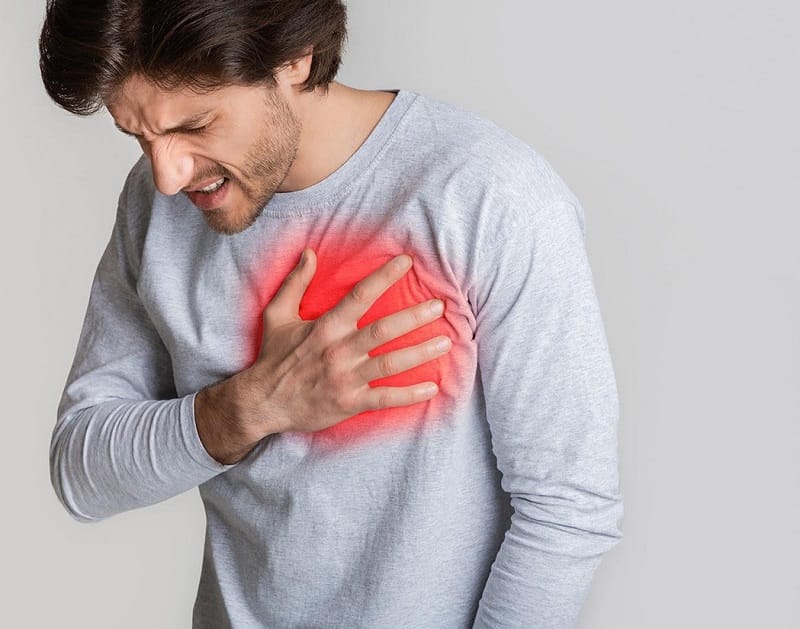Emotions not only affect mood but also directly affect cardiovascular health, even causing serious problems. So, how do emotions affect the cardiovascular system and how can we protect the heart from negative effects? Let's find the answer in the article below.
How do emotions affect the heart?
Emotions are not only a reflection of human feelings when sad or happy, but they also affect the body in many ways, especially through the nervous system and hormones. Especially when experiencing strong emotions such as anger, anxiety or stress, the body will activate physiological reactions that lead to damage to the heart and blood vessels. Specifically, some diseases related to emotional impact include:

- Hypertension: Prolonged anger or anxiety can put pressure on the blood vessel walls, leading to damage to the arteries and possibly a temporary increase in blood pressure.
- Increased heart rate: Prolonged strong emotions can cause the heart to work too hard by affecting the sympathetic nervous system, causing a faster heart rate.
- Muscle tension and inflammation: When you are depressed, stress can increase inflammation and muscle tension as your body produces hormones like cortisol. This can lead to cardiovascular problems like high blood pressure, coronary artery disease, or even a heart attack.
- Arrhythmia: In addition to muscle tension and inflammation, prolonged anxiety and stress can also lead to arrhythmias, causing the heart rate to become fast or slow, and can even lead to serious problems such as heart failure or stroke.
Some negative emotions affect the cardiovascular system
Life is a mixture of joy and sadness, however, negative emotions that last for a long time and are clearly shown on the face in the following states are really not good for the heart, specifically:
Strain
This is the body's natural response to a threatening situation or to stress itself out with negative thoughts. If prolonged, the hormones cortisol and adrenaline are secreted, increasing blood pressure, reducing immune function, increasing inflammation, making the heart work harder. In particular, chronic stress can lead to diseases such as heart failure, coronary artery disease and stroke.

Anxiety
In addition to stress, anxiety is also an emotional state that significantly affects cardiovascular health. Many studies have shown that panic attacks that cause prolonged anxiety are a risk factor for heart disease, and are most common in people with a family history of cardiovascular disease. Accordingly, anxiety attacks can increase the heart rate, thereby putting pressure on the heart, leading to the risk of stroke.

Furious
This is a fairly strong emotional state that can cause immediate effects on the cardiovascular system, increasing the risk of myocardial infarction and arrhythmia. The reason is that when angry, the body will secrete adrenaline and cortisol, which cause increased heart rate and blood pressure, which can lead to damage to blood vessel walls.

Depression
Depression not only affects the psychology, but also has a strong impact on cardiovascular health, increasing the level of inflammation in the body, causing the risk of coronary artery disease, heart failure and even stroke. In addition, depression can also lead to a sedentary lifestyle, difficulty sleeping, unhealthy eating, excessive use of alcohol, tobacco, etc. These are all risk factors for cardiovascular disease.
3. How positive emotions benefit the cardiovascular system
In contrast to negative emotions, positive emotions that show a state of happiness and relaxation on the face will bring countless benefits to the body, especially to the cardiovascular system.

According to recent studies, people with positive moods often have a lower risk of cardiovascular disease because a positive state will reduce blood pressure, reduce pressure on the cardiovascular system, and reduce inflammation in the body. From this, the blood vessels in the body will reduce damage, function well and reduce the risk of cardiovascular disease.

4. Emotional control measures to protect cardiovascular health
From the above information, it can be seen that emotions greatly affect cardiovascular health, especially in the elderly. The age group that often has the most negative emotional states due to anxiety and insecurity about aging. To protect the cardiovascular system well, controlling emotions is extremely important.
And to do this, it is necessary to have emotional management methods to reduce negative impacts on the cardiovascular system such as meditation, yoga, regular exercise, reasonable diet and rest. For people with severe depression or anxiety, they can participate in psychotherapy to control emotions and reduce the risk of cardiovascular disease.

In addition, you can also send “emotional treatment” through professional care and nursing services at Hio Care. With many years of experience in caring for the elderly and the ability to talk and understand, it will help the elderly feel comfortable, have more joy in life, thereby minimizing negative impacts on the cardiovascular system.
Not only mental care, Hio Care also has a comprehensive physical care plan for the elderly from diet, rest, exercise, all scientifically designed and standardized by medical and nutrition experts. All of these will help improve the quality of life of the elderly, and family members will also feel more secure at work.
Hopefully the above information will help you gain more knowledge about the relationship between emotions and cardiovascular disease. If you feel that you still have too many negative emotions, try to take the above measures to dispel them to keep your emotions stable and help your heart become healthier every day.




